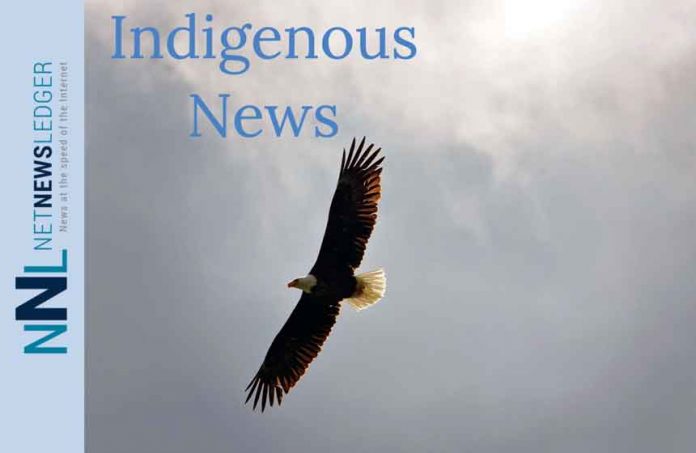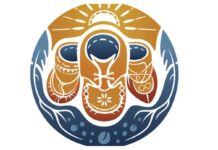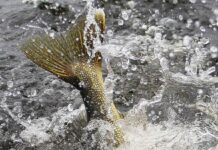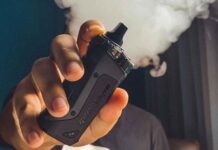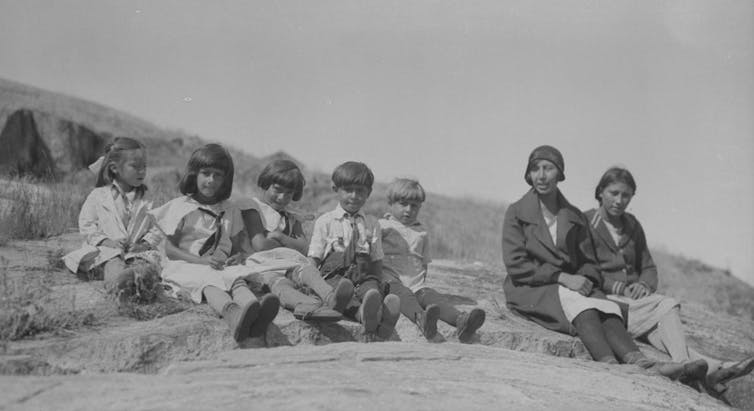
H. S. Spence, Canada. Department of Mines and Technical Surveys. Library and Archives Canada, PA-014406 /, CC BY-NC
Haley Lewis, The Conversation; Ibrahim Daair, The Conversation, and Vinita Srivastava, The Conversation
Episode 8: Stolen identities: What does it mean to be Indigenous?
Episode Description: Over the last few years, we’ve seen a lot of high-profile figures accused of falsely claiming Indigenous identity, of being “Pretendians.” These cases have become big news stories, but they have big real-life consequences, too. Misidentifying as Indigenous can have financial and social consequences, with the misdirection of funds, jobs or grants meant for Indigenous peoples. Vinita delves into it all with two researchers who look at identity and belonging in Indigenous communities: Veldon Coburn from the University of Ottawa and Celeste Pedri-Spade from Queen’s University.
Transcript
NOTE: Transcripts may contain errors. Please check the corresponding audio before quoting in print.
INTRO CLIP:
Veldon Coburn (VC): Who is that person who showed up to the conference wearing feathers and leather? What are they talking about? I don’t recognize a single thing that they’re talking about because they’re making it up.
Vinita Srivastava (VS): Today, we’re going to talk about something we’ve heard a lot about in the last few years, people getting called out for falsely claiming Indigenous identity. Sometimes these claims are based on old family myths: maybe a distant relative or a trace of Indigenous blood. But many Indigenous people say being Indigenous is more than just genealogy. They define belonging as having a community claim you and having truly lived Indigenous experiences. Others, they say, are simply pretending and taking away opportunities and resources meant for Indigenous people. And if we take a look at recent headlines, it seems tolerance for these so-called ‘pretendians’ is running out. In the United States, you have Andrea Smith, a prominent academic, back in the news after yet another story accused her of faking her Cherokee ancestry. Here in Canada, we had the case of prominent filmmaker Michelle Latimer. Latimer stepped down as the director of the much-loved TV series Trickster after her claim to Algonquin and Métis heritage was publicly challenged. She then hired a team of experts to trace her roots and based on her findings, maintain that she is a direct descendant of Indigenous people. And at Queen’s University earlier this year, an anonymous report accused several faculty and staff of falsely claiming Indigenous identity. An open letter signed by more than 100 Indigenous scholars called on the university to do better with its vetting process during hiring. My two guests today were amongst those who signed that letter. They both tackled the complexities of Indigenous identities in their work. Veldon Coburn is Algonquin from Pikwàkanagàn First Nation. He is an assistant professor in the Institute of Indigenous Research and Studies at the University of Ottawa. And Celeste Pedri-Spade is Anishinaabe from Lac des Mille Lacs First Nation. She is an artist and an associate professor and Queen’s National Scholar in Indigenous Studies at Queen’s University. Thank you both so much for joining me today.
Veldon Coburn (VC): Thanks for having us.
Celeste Pedri-Spade (CPS): Miigwech, thank you.
VS: So a question for both of you. And I think it is important that we start here first. But what does identity mean to you?
CPS: It’s such an easy answer. The first question people ask you is, oh, who’s your grandmother, who’s your mother, who’s your aunt? And you just answer that. So you’re always being checked on within your community like it’s not identity policing. It’s not exploiting your privacy. It’s how we’ve always done things as Anishinaabe, as Ojibwe people. So it’s paramount to think about that is who claims you like being in relationships with people that are also from families that are connected to Lac des Mille Lacs First Nation, to Nezaadiikaang – that’s our name, place of poplars – and to understand our history with place and with people. And that informs who we are. And it always has.
VC: They’re taking legitimate political identities, and every identity is fairly political in the sense, but formalized national citizenship that we once managed ourselves and reducing it to cultural flavours of those who show up to a powwow or who say that they picked up a dream catcher at the truck stop and decided to hang it in the rear-view mirror of the car, and they feel some sort of connection. It’s not at all like that. It’s individuals with political, economic, social and civil rights that are attached to their membership in a political community.
CPS: It’s not about a person’s right to acknowledge their Indigenous ancestry, let’s say, from the 18th or the 17th century. Right. It’s really, to me, an issue that people are exploiting indigeneity to occupy positions that by and large are created through equity, diversity and or truth and reconciliation initiatives. So to me, when you bring in people to those spaces when they’ve never faced discrimination based on their cultural, racial, political or socio-economic status. And also, have never shouldered the intergenerational trauma related to Indian residential schools, then you’re really missing your mark. The people who are claiming indigeneity based on this long ago ancestry are simultaneously refusing to acknowledge that their entire claim is based on a biological trace of Indigenous blood in their genetic story. There’s probably like 50 other people that they actually work with that could say the same thing. Why is it that they’re claiming indigeneity and the 49 other people aren’t.
VS: So it’s these are the kinds of stories where you hear like, “I mailed out my DNA kit and it came back and it’s showing that this thing.”
CPS: Or mining the archive. It’s very extractive. It’s this idea of ‘I’m going to intentionally mine my family archive in order to be able to find that one unidentified native woman.’
VS: Why would anybody want to do this? Why would anybody want to falsely claim Indigenous identity? And why are they doubling down on the claim after they’re called out?
VC: It is a little bit surprising because being Indigenous for the longest time for hundreds of years is not a prized identity. So, I’m not sure where someone wants to say, ‘you know what, that highly denigrated identity is one that I’m going to adopt for myself and wear it out.’
VS: This is the one that I fantasize now like I’ve denigrated you for. Now I fantasize to be you. What’s that about?
VC: Right. So, I think that’s part of the work that Indigenous Peoples we’ve done for ourselves. So for the last maybe 40 or 50 years, Native Pride, which is sort of the banner or slogan that’s emerged out of the Red Power movement, is to reinvigorate Indigenous pride in ourselves when so much has been taken. And working on that, despite all of the racism and the negative stigma that’s been attached to being Indigenous since contact, almost. Why? What would possess anyone to say one of the worst, the most stepped on identities is one that I’m just going to slide in very sneakily and adopt? I think it’s because of the sort of cultural zeitgeist and the moment that we’re in right now is that after the Truth and Reconciliation Commission, after the national inquiry and missing murdered Indigenous women and girls, and the work, extremely painful, especially after Idle No More that some people thought it might be kind of trendy. And again, it’s never really any of the the baggage that we have. A lot of people really only want to take whatever sort of good that they can from it.
VS: But is it also partly I want to be someone or I want to have some meaning in my life or I want sympathy or, you know, any of those things?
VC: Sometimes – and I have discussions with other colleagues and I have no background in psychology or what have you – but understanding attitudes, beliefs, norms and studying that from political science sort of background and social science is wondering about what prompts an individual to reorient themselves in such a way? I sometimes wonder about the personality type that it takes that they would abandon their vast majority of, say, settler-colonial identity as white Anglo-Saxon colonials, where if you go back 10 generations, I believe it’s 4096 ancestors and one magical ancestor enough to override — the majority of your ancestry and heritage has been violently colonial. And so it’s sort of a colonial privilege of theirs that one day they can be white settler colonials, the next day, if they feel like it, they’ll be Indigenous, whereas we’ll always be Indigenous and we’ll never be fully welcome in white spaces. And people who say, well, what’s the harm in that? One of the more very pressing material issues was about the Algonquin modern treaty. Thirty six thousand square kilometres are on the table and after 40 years, the negotiations have whittled us down to four hundred and seventy six square kilometres. That’s 1.3 per cent of our territory that we will be left with. And the reason why is mostly because of people who came out of the woodwork in the last 20 years after my community, Pikwàkanagàn, did the majority of the work and started to claim these distant ancestors and many of them have been proven to not be Algonquin, let alone Indigenous whatsoever, because we’ve had some sort of adjudication and alternative dispute resolution mechanisms where we’ve said, wait a second, this ancestor that you’re coming to is not even Algonquin, let alone Indigenous that you’re claiming gives you the right to vote and actually negotiate, be at the negotiation table and make claims and give away what we’re now at 88.3 per cent of our territory.
VS: Oh, so so they have the right to vote. Basically, that’s the issue. Then they become a member of this nation and have the right to vote regarding the landholding.
VC: They actually don’t even become a member of the nation. The Crown has only recognized them as Algonquin for the sole purpose of modifying and extinguishing our title to territory and rights. So they may never even actually be beneficiaries, whereas all the people in my small community of twenty five hundred people – and not all of them are adults so they don’t get to vote – there’s only about 1,800 of us, but the number of Algonquin voting on this has exploded to 8,600. And most of them, my community says you’re drawing your ancestry back to the graveyard.
VS: So the consequences are so real when it comes to transfer of title to the crown or maintaining access to land.
VC: That’s right. It’s basically having an outsider come in and ensuring that your title be extinguished. But it runs a gamut. You know, it could be anything from skewing statistics on, say, key socio-economic indicators. For instance, my own research and I was bewildered by this back in 2016 when I was looking at post-secondary education outcomes, is that in Newfoundland, of all the places, they had closed the post-secondary education outcome gap. So in the rest of the country, university attainment between Indigenous Peoples and non-Indigenous population in Canada usually runs at about 14 per cent. We’ve been doing OK. That’s for university degrees. Now in Newfoundland, the Indigenous population happens to be more educated. And so why is that? And I, I couldn’t understand how that happened when the rest of the country is, you know, is still showing such differences and socioeconomic outcomes. The reason was in 2011, everyone in Newfoundland and their dog was identifying as Indigenous because of the new landless reserve community of Qalipu. So, at that time, they were creating the — and it doesn’t have — it’s basically there is no reserve community for it. But they created the band and the Crown accepted about 118,000 applications to be considered Indigenous. And part of the proof was, have you ever identified as Indigenous elsewhere, like on a census? So the census data skewed things because, well, we no longer need to invest in post-secondary education for Indigenous people in Newfoundland because they’re actually outperforming the non-Indigenous population.
VS: Right. So the consequences are intense. So it really can impact social policy, health policy, education policy, where money and resources get allocated?
VC: Right. So it’s about the distribution of benefits and burdens in society and the perception that we have. And it can also go back to popular representation. So, with the ‘pretendians’ you opened up today and you said, well, you know, we’re starting to stop tolerating them because, well, they’re cartoonish and clownish. It’s sort of a parody and a caricature of who we are because the way they sort of present themselves, you’ll see, you know, other Indigenous people at conferences and say, who is that person who showed up to the conference wearing feathers and leather? What are they talking about? I don’t recognize a single thing that they’re talking about because they’re making it up.
VS: One of the biggest cases this past year was Michelle Latimer. And, you know, the work that she directed, both written originally by Indigenous authors, Inconvenient Indian, the documentary, and Trickster, the series on CBC. Inconvenient Indian didn’t end up getting released and Trickster was cancelled by CBC. I’m just wondering, especially Celeste, I’m wondering if you could talk a little bit about this as an artist. What about the specific harms in this case?
CPS: Well, I mean, you’ve seen the trickle down effect of how many Indigenous artists, creators were affected by what happened with her and then suffered because of that. Was this worth it because of what happened to and how it affected negatively real, amazing people and people that have really struggled to be actors, to be creating content? Then you go, well, imagine what it could it have been right if it had been led by somebody who was truthful and authentic, right? That’s a teaching that my Elders have taught me is that things need to be started in a truthful, good way, because even if the intentions are good, if it’s not truthful at its core and it’s not grounded in our authentic way of being, it’s going to fall apart. So when you have to become Indigenous artists again, this extract extractive way, you know, they feel that this justifies their place to claim and publicly educate about experiences that they and the generations of white settlers that came before them have never experienced. And so they’re not speaking from an Indigenous perspective. They’re not speaking from a place of truth or strength or intelligence or integrity. They’re not actually speaking of colonial violence or displacement, rather, they are seeking to displace, harm and perpetuate settler colonialism even when their intentions are good. All of this comes down to being truthful, living your truth and being accountable for your lived experiences. I don’t see it as complicated. It becomes complicated when people are trying, I think, to advance their own particular individual interests by claiming things in settler colonial institutions. It’s not complicated, the issue of who’s who. And so, again, like I said, it’s really frustrating to hear that sort of institution say, oh, it’s just really complicated as sort of a way to skirt around the issue.
VS: Around the issue of basically this is identity theft and we need to talk about it?
CPS: Yeah, of just doing the work of really working with Indigenous folks, Indigenous communities to understand how do you determine who belongs. Indigenous hiring is meant, I think, to bring in Indigenous people that have and continue to be structurally and systemically discriminated against within predominantly white settler colonial organizations. And these is hiring practises are not meant to make it possible for people who likely have a remarkably similar genetic and ancestral story to many of their white settler colleagues to simply shift into an Indigenous role because they see themselves more enlightened or knowledgeable or proud of their Indigenous ancestral connection.
VS: I know Veldon, you’ve co-authored some protocols that basically suggest how university students and professors, you know, what responsibilities they have to each other, especially around the false identity claims.
VC: Well, yeah, some of it was about ethics in research. It strikes me as a little bit more egregious, too, when people make these claims within the academy, because a lot of it could be around health and health sciences, human sciences as well. So the enter into agreements or find funding and it’s a little bit exploitative, too, because they go into communities and they sort of feign their identity to open up doors. And as I understand, there may be other people who in different industries to that use it to grease the wheels of commerce, governments and granting institutions want to overcome historical disadvantage and deprivation. So they want to tailor things or at least open up the door to Indigenous Peoples to access things that were denied to them for so long. And other people use it to walk right in the door and collect things that, well, they may not have the same moral claim to. And then they use it to make representations on behalf to shore up their credibility as a researcher. So especially in health sciences, when they go in and work with vulnerable populations, the ethics of the research and the position of the researcher themselves kind of comes into question. So I find those who are making these sort of really tenuous and non-existent claims and presenting themselves as Indigenous sort of kind of caricatures of it.
VS: As much as I say I want to talk about Queen’s University, I feel guilty about taking space talking about this again.
VC: It’s actually a phenomenon that’s happening everywhere. And Queen’s should be a cautionary tale for almost every institution. But we all know and we really talk about these in our Indigenous circles, because the open letter that we had signed was by over 100 Indigenous scholars. We know each other. We know our communities. But then when somebody comes onto the scene and into the circles and they start talking about a community that really only exists as a Facebook page or a little bit of a rinky-dink website where they’re giving out their own membership cards and you question the legitimacy — and they’re very ambiguous. And this is really where Michelle Latimer got caught up, is that she was making ambiguous claims. And then when she was asked to say, can you be a little bit more specific because, well, you’re saying you’re Algonquin Métis. And then she named a particular community and that community says, no, you’re not one of us. We don’t know you. You’re not related to anyone from here, you know, but in academia to return to it. Is that in the zeitgeist that we’re in, you know, the prevailing winds, the culture, and there is an embrace by senior administrators or at least those who are pressured to have actual research or representation of Indigenous Peoples in their positions and also to access significant financial and also non-financial resources, as well as the networks and rooms that you can get into.
VS: Sure, yeah.
VC: So, I think it’s a little bit galling, and especially the hurt … these people, when they ask them, well, so you made all this up? And they kind of are backed into the corner, yeah, I think most of it’s a lie. I presented myself as someone who was deeply embraced and entrenched in an Indigenous community. And, well, sometimes I’ve made up the community. Sometimes I’ve made up my connection. I’m actually not Indigenous whatsoever. So you’re taken aback. You’re kind of appalled by the behaviour. Like there’s a breach of —
VS: It’s a breach of trust. It’s so heartbreaking. I’m sure you can participate and produce with Indigenous people as a settler who is an ally.
VC: And I do that often. I point to all my settler colleagues who do it honourably and respectfully. They don’t try to reframe themselves. So when they’re called out after the ‘pretendians,’ as it were, you sort of think did you and the institutions that supported them too, or who will double down on it that will say, do you think so low of our identity? That is just something that you can pick up on the fly? That you can just wander into? That you had that sort of entitled access to it?
VS: There are so many words that are coming to my mind, like the exotification, the exploitation, the privilege of just taking.
VC: I mentioned it earlier that I don’t know the psychology behind it, but sometimes you get the sense that we’re being fetishized as objects. We are not subjects with moral agency. We are objects for them to adopt and to coddle as a pet sometimes.
CPS: If we want to be committing to truth and reconciliation, I think that all of these issues, they should be prioritized. And I feel that that’s the problem, is that they’re not. There are some pretty alarming things that I think they could have addressed quite easily.
VS: Yeah. How do I trust this institution at all at this time?
CPS: That’s right. And like, what do you mean? Like, where is your responsibility to me to make sure that I’m not in a toxic working environment? When you refuse to be in those spaces by saying, you know what, this isn’t cool, you’re not setting this up in a way that is going to be safe for me. And these so-called ‘pretendians’ are legitimized right within the institution. They show up to our circles. And it’s like, yeah, because that’s the only circle they have when the gravesites are uncovered. Right. We’re in the community. When that happened people were like, are you coming to support the Indigenous Queen’s community? And I’m like, no, man. I’m going to take my uncle, who’s a residential school survivor, out for a steak lunch. Yeah. And then we’re going fishing. Right. Like, you know. Yeah. I’m not going to go and perform my trauma for mostly non-Indigenous folks.
VS: Well, there’s something about that performative trauma that I’m just imagining, that as a ‘pretendian’ it’s maybe more palatable to settlers.
CPS: Yeah. I’ve talked about this with Veldon and —
VS: It’s less messy, I don’t know.
CPS: It’s also less challenging. It’s always easier to accept and love and embrace a so-called Indigenous person who acts a lot like you, thinks a lot like you, talks a lot like you because they are you than it is to actually have to accept that when you get the real person you’re going to get somebody who doesn’t look like you. They don’t think like you. They don’t often say the things that you want to hear and are not asking for a seat at the table. They’re asking you to dismantle the table.
VS: Exactly. They’re saying dismantle the table and that’s very uncomfortable.
VC: One of the most obnoxious things about ‘pretendians’ is them being the white people. Is that the sort of recentre and reframe, I guess, the emotive and effective state of affairs is that when something traumatic comes out, you’re there to comfort the white people. It’s like, you know what, we forgive you, don’t feel bad. Please don’t feel bad about your colonial history. It’s like, wait a second, we’re here to mourn right now. Yeah. And it’s not about like coddling.
VS: It’s not about you. I want to try to see if we can end in a different way, which is we’ve been talking a lot about identity theft, and I’m wondering, can we talk about some of the ways that you both uplift Indigenous identity? I mean, I’m not sure if that’s the right language, but I know Celeste, one of the videos I was watching of you about your artwork, you talk about the revolutionary act of, you know, talking about and producing identity. How do you do this for yourself as not just for yourself, but as an Anishinaabe scholar and also as an artist?
CPS: You do this work really carefully, and it is revolutionary because you can’t — I mean, I’d be lying to say that I am this proud, like I mean — I want to be this proud Anishinaabe, proud Ojibwe woman, but that is like everyday work that you’ve got to do that, you know, and unpacking all of the different layers of trauma that you’ve experienced that are connected to what my mother did and what my grandmother did and what I find so important to my own, I guess, journey of understanding what that means, to be a proud member of my community, my nation is really being in relations and really helpful and respectful and loving relations with other Ojibwe women. And art has always been that way for me to connect to really inspiring strong, fierce Ojibwe women. And I feel that’s something that is always been that way. Right. So you can go and look back at artistic the material culture practises of women that came before us and how that was always a community building activity. My mom would say makers, Anishinaabe Ojibwe women are makers and we make things for our people. We make, whether it be moccasins, shirts, producing stories. We’re doing that intentionally together for the betterment of people in our family, the people that we care about and love. For me as an artist, that will always be and I think it’s a lifelong journey of doing that work together collaboratively with people in my family. I mentioned my mom, my mom has been a big inspiration and role model to me in my life for, again, because of what she went through, my grandmother as well, because of what she went through. And that to me is really, again, the artistic practice, but it’s also about the relationships with place and the land. I’m a mother, a mother of four young, three young boys and a small 18-month-old baby. And I always think about the things that I’m doing, like the gift that I can give them and leave them and things that I’m working on reclaiming. And I always feel that when I leave the world, if I’ve left the world knowing that my children can live like my great grandparents, they were not dependent on anything that is manufactured or built around us. They just need the land and the water to be well, that they can go out there and they know like they have those skills to go out there and live if, like we say, the zombie apocalypse, whatever, I’ve left in a good way. I’ve done my job, because that to me is really what we need of getting away from dependency. My husband and I often talk about this for my children to have that knowledge means that they will always have their stronger convictions guided by who they are as Ojibwe people. We could say our concept of rich, right, is to be in good relations with the land in the water.
VS: It’s beautiful. Veldon. That’s how we started, in a way. What are the things that you do to honour your Pikwàkanagàn identity and also your community?
VC: Yeah, I think my commitment is actually to a larger Algonquin Anishanaabe nation itself. We’re a part of it. And, you know, I can repeat a lot of the things that Celeste said so eloquently, but I’ll just say that it is for the integrity of the Algonquin nation that I continue in service for.
VS: Thank you.
CPS: That’s amazing, because Veldon you just reminded me of what people in my family, my mom would say, sovereignty begins at home.
VC: It is the family that produces and renews the nation. And it is not the graveyard, unfortunately, it is not the archive.
VS: Thank you so much for being with me today. I really appreciate all of the time that you’ve given to this conversation.
VC: Yeah, thanks for having us, miigwech.
CPS: Miigwech, thank you so much.
VS: That’s it for this episode of Don’t Call Me Resilient. Lots to process there from Veldon Coburn and Celeste Pedri-Spade. We’d love to hear what you’re thinking. I’m on Twitter at @writevinita. And don’t forget to tag our producers @conversationca. Just use the hashtag #DontCallMeResilient. And if you’d like to read more about false claims of Indigenous identity, go to theconversation.com/ca. We have all kinds of information in our show notes with links to stories and research. Finally, if you like what you heard today, please help spread the love. Tell a friend about us or leave us a review on whatever podcast app you’re using. Don’t Call Me Resilient is a production of The Conversation Canada. It was made possible by a grant for journalism innovation from the Social Sciences and Humanities Research Council of Canada. The series is produced and hosted by me, Vinita Srivastava. Our producers for this episode are Haley Lewis and Susana Ferreira, and our associate producer is Ibrahim Daair. Reza Dahya is our incredibly patient sound producer and our fabulous consulting producer is Jennifer Moroz. Lisa Varano leads audience development for The Conversation Canada and Scott White is our CEO. And if you’re wondering who wrote and performed the music we use on the pod. That’s the amazing Zaki Ibrahim. The track is called Something in the Water. Thanks for listening, everyone, and hope you join us again. Until then, I’m Vinita. And please, don’t call me resilient.![]()
Haley Lewis, Culture + Society Editor, The Conversation; Ibrahim Daair, Assistant Editor | Culture + Society, The Conversation, and Vinita Srivastava, Podcast Producer + Host | Senior Editor, Culture + Society, The Conversation
This article is republished from The Conversation under a Creative Commons license. Read the original article.

